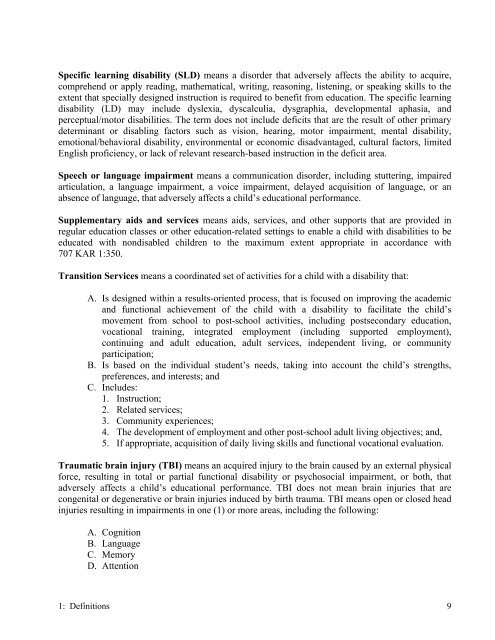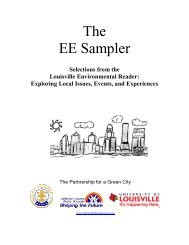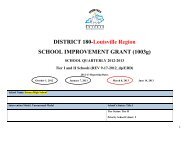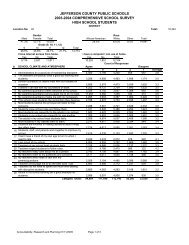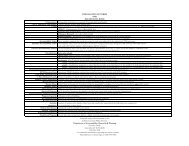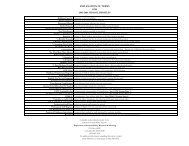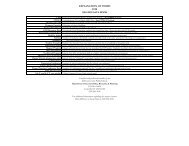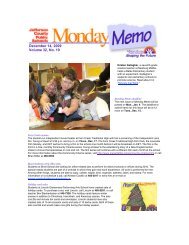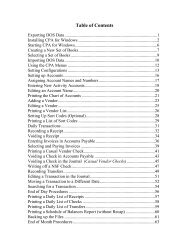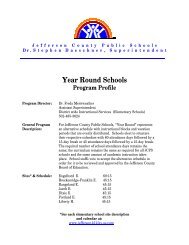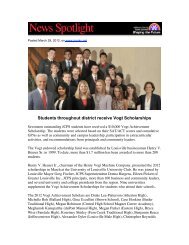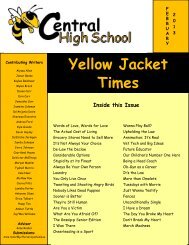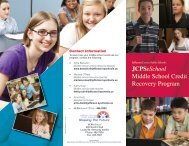exceptional child education - Jefferson County Public Schools
exceptional child education - Jefferson County Public Schools
exceptional child education - Jefferson County Public Schools
Create successful ePaper yourself
Turn your PDF publications into a flip-book with our unique Google optimized e-Paper software.
Specific learning disability (SLD) means a disorder that adversely affects the ability to acquire,<br />
comprehend or apply reading, mathematical, writing, reasoning, listening, or speaking skills to the<br />
extent that specially designed instruction is required to benefit from <strong>education</strong>. The specific learning<br />
disability (LD) may include dyslexia, dyscalculia, dysgraphia, developmental aphasia, and<br />
perceptual/motor disabilities. The term does not include deficits that are the result of other primary<br />
determinant or disabling factors such as vision, hearing, motor impairment, mental disability,<br />
emotional/behavioral disability, environmental or economic disadvantaged, cultural factors, limited<br />
English proficiency, or lack of relevant research-based instruction in the deficit area.<br />
Speech or language impairment means a communication disorder, including stuttering, impaired<br />
articulation, a language impairment, a voice impairment, delayed acquisition of language, or an<br />
absence of language, that adversely affects a <strong>child</strong>’s <strong>education</strong>al performance.<br />
Supplementary aids and services means aids, services, and other supports that are provided in<br />
regular <strong>education</strong> classes or other <strong>education</strong>-related settings to enable a <strong>child</strong> with disabilities to be<br />
educated with nondisabled <strong>child</strong>ren to the maximum extent appropriate in accordance with<br />
707 KAR 1:350.<br />
Transition Services means a coordinated set of activities for a <strong>child</strong> with a disability that:<br />
A. Is designed within a results-oriented process, that is focused on improving the academic<br />
and functional achievement of the <strong>child</strong> with a disability to facilitate the <strong>child</strong>’s<br />
movement from school to post-school activities, including postsecondary <strong>education</strong>,<br />
vocational training, integrated employment (including supported employment),<br />
continuing and adult <strong>education</strong>, adult services, independent living, or community<br />
participation;<br />
B. Is based on the individual student’s needs, taking into account the <strong>child</strong>’s strengths,<br />
preferences, and interests; and<br />
C. Includes:<br />
1. Instruction;<br />
2. Related services;<br />
3. Community experiences;<br />
4. The development of employment and other post-school adult living objectives; and,<br />
5. If appropriate, acquisition of daily living skills and functional vocational evaluation.<br />
Traumatic brain injury (TBI) means an acquired injury to the brain caused by an external physical<br />
force, resulting in total or partial functional disability or psychosocial impairment, or both, that<br />
adversely affects a <strong>child</strong>’s <strong>education</strong>al performance. TBI does not mean brain injuries that are<br />
congenital or degenerative or brain injuries induced by birth trauma. TBI means open or closed head<br />
injuries resulting in impairments in one (1) or more areas, including the following:<br />
A. Cognition<br />
B. Language<br />
C. Memory<br />
D. Attention<br />
1: Definitions 9


